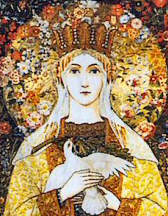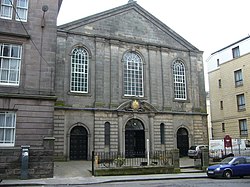Ecuminism 1987
The Clergy Review January 1987
Editor, Questions raised by the present state of ecumenism, 11
Articles
The Church, The Churches and the World
By James
Quinn, S.J.
Church of the Sacred Heart, 28 Lauriston Street, Edinburgh, Scotland
I The Church
The
manifold life of the Church
THE
CHURCH is the creation of the Holy Spirit, the covenanted sphere of his
operations in the world. The Church is essentially a mystery, not simply
an object of study as a 'religious phenomenon'. It is a mystery of faith, part
of the mystery of faith that is Christ, true God and true man, the one mediator
between God and mankind, the Head of his mystical Body which is the Church.
The Church can indeed be studied as a religious society. Part
of its organization is time conditioned, subject to change: this is what we may
call its ecclesiastical life. But its true life, what makes it
distinctively ecclesia or Church, is its God-given endowment as the
foretaste, the promise and the instrument of its final fulfilment in heaven. We
may call this its ecclesial life. This is not open to change.
The Church is therefore at once visible and invisible: one may say
that it is sacramental. Like Christ, the great and original sacrament,
revealing and communicating the divine life, the Church reveals and
communicates God's truth and love and life through outward signs. The church is
not wholly invisible, though its true life can be recognized only by the eyes
of faith.
To stress the human, visible side of the Church can result in a
false understanding of the meaning of the people of God, as if the
Church were modelled on a human community essentially unstructured and
democratic. The Church is a unique creation, 'not of this world', though composed
of human beings with all their frailty. But sinful humanity is called by God
into a special relationship with himself: they are a people brought into being
in the Holy Spirit, a covenanted community whose members are given an
individual vocation to holiness and assigned different functions within the one
Church, in particular the essential functions of Pope, bishops, priests,
deacons and the unordained faithful.
But we must not underestimate the ecclesiastical life of
the Church. Human beings need structures. There is a particular human value in
a certain degree of uniformity: in ritual, in the discipline of Christian life,
in customary devotions .. These 'incarnate' the Gospel in a living and human
way, but they can degenerate into lifeless routine. Change is important when
the pattern ceases to be a true expression of the essential life of the Church,
when the routine no longer supports and deepens the living of the Christian
life in fidelity to the Gospel.
The
formula of the Nicene Creed
The Creed drawn up by the Councils of Nicaea (325 A.D.) and
Constantinople (381 A.D.) is ir, regular and frequent use in the Catholic
Church. It contains a summary of the 'marks' of the Church: 'We believe in one
holy catholic and apostolic Church'.
The Church is one. Its unity is a reflection or. a sharing
in, the unity of the Blessed Trinity. The Church is a supernatural communion
of faith, hope and love. This communion is basically sacramental, centred
on Baptism, Confirmation and Holy Order. These sacraments create the eucharistic
community: that is the simplest and most profound description of the nature
of the Church. The Church gathered at the Eucharist ;, the fullest expression
of the Church's life, where Word and Eucharist together form the source of the
Church's vitality and the high point of its activity. The Eucharist is the
celebration of the Church's unity.
The Church is holy. The holiness of the Church is not only
the holiness of its members but tr.; holiness that is her essential endowment:
she is 'our holy Mother the Church'. The Holy Spirit entrusts her with the
distribution of his many", gifts: faith, hope and charity; prayer; the
sacraments; the prayerful study and authentic, proclamation of God's Word; the
means to h: the Christian life in fidelity to God's plan for human nature; the
many and varied 'charisms' of individuals
and communities,
The Church is catholic. It is catholic. i.e. universal, in
its mission, in its teaching (embracing the fullness of the faith). There is an
identity, an equation, between the local Church (i,e, the diocese) and the
universal (i.e. the catholic) Church. The local Church is catholic because of its
sacramental relationship to the Pope and the college of bishops (of which the
Pope is the head) through the person of its own bishop.
The Church is apostolic. It is in continuity with the
apostolic Church through its possession of the same apostolic authority, the
same content of faith, the same power of sanctification. There can be
development, but without addition, subtraction or distortion.
The
Church and the Eucharist
The great activity of the Church (i.e. of the Body of Christ in
head and members) is the Eucharist, the apex and the source of the Christian
life.
Before the Eucharist can be celebrated there must be formed the
priestly people through Baptism, Confirmation and Holy Order.
Baptism creates the active priesthood of the whole people of God.
Confirmation reinforces this.
Holy Order creates the specific priesthood of the ordained, which
enables the baptized (and the confirmed) to exercise their 'common' priesthood
in union with Christ and the ordained priest. Holy Order makes the priest an
instrument in the hands of Christ (in persona Christi in offering (as
part of the whole Church) the sacrifice of Christ the High Priest.
The Eucharist is the sacramental celebration of the Paschal
Mystery of Christ. The presence of Christ the High Priest is the key to
understanding the sacrifice of the Mass. There is an upward movement of
self-offering (of Christ, of the Church, of the priest, of the congregation)
before there is the downward movement in which the Father returns to us in
Communion the gift of his Son. The Eucharist is not only God's gift to us but
also our gift to God through, with and in Christ. 'Our gift' is
the gift of the totus Christus, of the whole Christ, of the whole
Church.
11
The Churches
The will of Christ
At the Last Supper Christ prayed for his Church, that it might be
one. Unity among all his .followers is clearly his great desire. This unity is to
be complete and perfect, having as its source and model the unity of Father,
Son and Holy Spirit.
But Christians, though accepting Christ as their Lord, find
themselves divided from each other in different ways. In obedience to Christ we
must do all in our power to undo division- among Christians, and in their place
to build up true Christian unity.
The Second Vatican
Council, in its Decree on Ecumenism, points out that work for Christian unity
is a duty of every Catholic. It is a work for the whole Church, not for bishops
and priests only. Each parish should have its own contribution to make towards
the Church's commitment in this field.
The ecumenical
movement is essentially a meeting of Churches, through their members.
But it must not be simply the enthusiasm of the few: it must be the
responsibility of all, according to each one's talents and opportunities.
The
way of renewal
The Decree on Ecumenism also points out that the way to Christian
unity is through spiritual renewal within each Church, and in the life of every
Christian.
The unity of the Church is the gift of the Holy Spirit, the bond
of love. It is therefore a work that demands our co-operation through prayer.
Prayer is the first and necessary condition of work for Christian unity.
Work for Christian unity requires also the fruits of prayer in our
individual lives and in the life of the whole Church. It demands spiritual
renewal, holiness of life, fidelity to Christ.
It asks for a spirit of penitence for sins against charity. There
arc many personal and community barriers - suspicion, prejudice, lack of
charity, bad example - which must be removed before the Holy Spirit can heal
our divisions.
The spirit of unity
If we are to grow
together into the fullness of unity, we must first want unity. We must
want it, not for our own glory but in humble obedience to Christ.
We should want other
Christians to be one with us because we miss their presence and feel somehow
incomplete without them. We must see them, not as rivals or strangers, still
less as enemies, but as fellow-pilgrims who belong to us in a very real sense,
through our spiritual kinship with them by baptism.
There should be a
spirit of forgiveness where we may think that other Christians have wronged us. There should be a spirit of
repentance for our own sins against other Christians.
Above all, we should
not live in the past but in the reality of the present, and in hope of a more
Christian future.
The Eucharist and Christian unity
The Church is
essentially a communion of faith, hope and love. It is a communion with Father,
Son and Holy Spirit, as well as a communion with all its members in the Body
of Christ.
Baptism is the basic,
initial sacrament of Christian unity. It establishes a sacramental bond among
all who have been baptized.
Holy Communion is the
crowning sacrament of Christian unity, setting the seal on perfect unity.
The supernatural
communion which is the Church must be seen as a true community in itself, but
also as a community seeking to welcome into its unity the whole family of
mankind.
The Church can be its true self, the community of love, only
through its own unity in the Spirit, centred above all on the Eucharist, the
sign and focus of love, and the goal of Christian unity.
It is at the Eucharist that all prayer for Christian unity must
begin, and in God's good time receive its perfect answer.





 Our Lady Queen of Peace has been the patroness of the Catholic Church in Hawaii since 1827. The first Catholic missionaries to the Hawaiian Islands arrived at Honolulu Bay on July 7, 1827. These missionaries were members of the Congregation of the Sacred Hearts of Jesus and Mary and of Perpetual Adoration and upon their arrival in the islands dedicated their labors to the patroness of the Congregation, Our Lady Queen of Peace and placed the Islands under her protection. It was in her honor that these missionaries erected the first Catholic Church.
Our Lady Queen of Peace has been the patroness of the Catholic Church in Hawaii since 1827. The first Catholic missionaries to the Hawaiian Islands arrived at Honolulu Bay on July 7, 1827. These missionaries were members of the Congregation of the Sacred Hearts of Jesus and Mary and of Perpetual Adoration and upon their arrival in the islands dedicated their labors to the patroness of the Congregation, Our Lady Queen of Peace and placed the Islands under her protection. It was in her honor that these missionaries erected the first Catholic Church.

